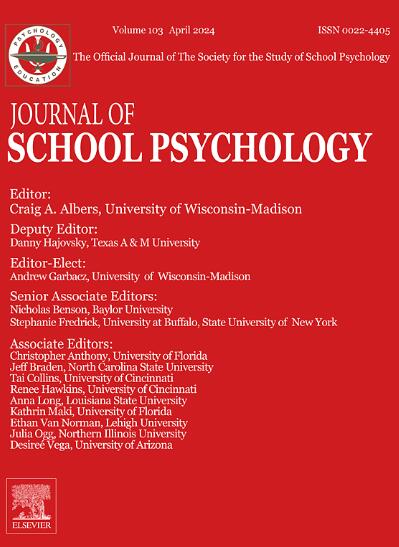Examining social withdrawal in relation to academic enablers in students with and without cognitive disengagement syndrome
IF 4.1
1区 心理学
Q1 PSYCHOLOGY, SOCIAL
引用次数: 0
Abstract
Students' social behaviors are associated with academic enablers and academic outcomes. However, social withdrawal, a key correlate of youth with cognitive disengagement syndrome (CDS), has not been examined in relation to academic enablers. In this cross-sectional study, we examined associations between teacher-reported social withdrawal and academic enablers, and also whether associations differed for students with or without teacher-reported elevations in CDS. We hypothesized that social withdrawal would be significantly associated with each academic enabler and that CDS would significantly moderate each association. Participants were 257 2nd-5th grade students (Mage = 8.79, 36.6% female) with (n = 129) and without (n = 128) elevated CDS symptoms. In regression analyses controlling for family income, medication use, and ADHD symptom severity, higher social withdrawal was independently associated with lower interpersonal skills, CDS status was uniquely associated with lower motivation, and both social withdrawal and CDS status were uniquely associated with lower engagement. Results from interaction models indicated that higher social withdrawal was associated with lower study skills and lower homework self-regulation for students with CDS but not for students without CDS. Findings point to the potential importance of social withdrawal for the academic enabler behaviors of elementary students, particularly for students with clinically-elevated CDS symptoms. Implications of these results have the potential to inform both assessment and intervention in school to support students' academic functioning.
在有和没有认知脱离综合症的学生中研究社会退缩与学业促进因素的关系
学生的社会行为与学业促进因素和学业成果相关。然而,社会退缩,与青少年认知脱离综合症(CDS)的一个关键相关,尚未被研究与学术使能因素的关系。在这项横断面研究中,我们检查了教师报告的社交退缩和学业促进因素之间的关联,以及是否存在教师报告的CDS升高的学生之间的关联有所不同。我们假设社会退缩与每个学术促进因素显著相关,而CDS会显著调节每种关联。参与者为257名二年级至五年级学生(性别= 8.79,女性36.6%),有(n = 129)和无(n = 128) CDS症状升高。在控制家庭收入、药物使用和ADHD症状严重程度的回归分析中,较高的社交退缩与较低的人际交往能力独立相关,CDS状态与较低的动机独特相关,社交退缩和CDS状态都与较低的投入独特相关。互动模型的结果表明,较高的社会退缩与有心理障碍的学生较低的学习技能和较低的家庭作业自我调节有关,而与无心理障碍的学生无关。研究结果指出,社交退缩对小学生学业促进行为的潜在重要性,特别是对临床出现CDS症状升高的学生。这些结果的含义有可能为学校的评估和干预提供信息,以支持学生的学业功能。
本文章由计算机程序翻译,如有差异,请以英文原文为准。
求助全文
约1分钟内获得全文
求助全文
来源期刊

Journal of School Psychology
PSYCHOLOGY, EDUCATIONAL-
CiteScore
6.70
自引率
8.00%
发文量
71
期刊介绍:
The Journal of School Psychology publishes original empirical articles and critical reviews of the literature on research and practices relevant to psychological and behavioral processes in school settings. JSP presents research on intervention mechanisms and approaches; schooling effects on the development of social, cognitive, mental-health, and achievement-related outcomes; assessment; and consultation. Submissions from a variety of disciplines are encouraged. All manuscripts are read by the Editor and one or more editorial consultants with the intent of providing appropriate and constructive written reviews.
 求助内容:
求助内容: 应助结果提醒方式:
应助结果提醒方式:


